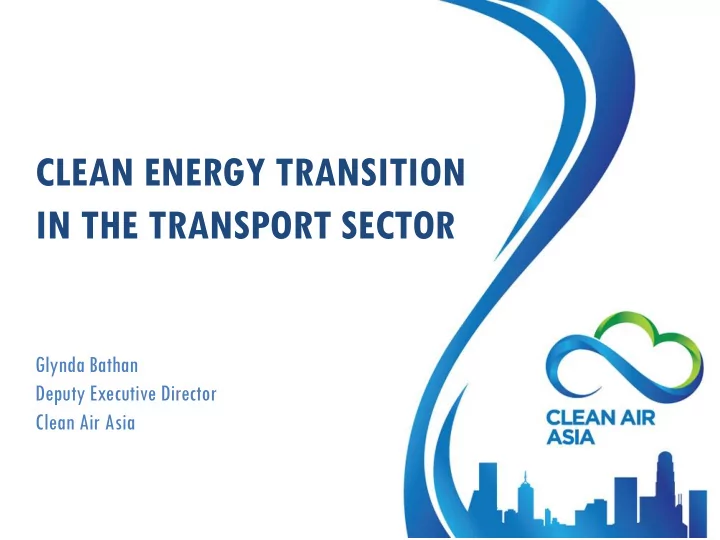

CLEAN ENERGY TRANSITION IN THE TRANSPORT SECTOR Glynda Bathan Deputy Executive Director Clean Air Asia
Barriers clean energy transition in transport • Lack of ambition in setting mitigation goals for the transport sector in NDCs (i.e. they are not sufficient to bring the sector’s CO2 emissions in line with the 2 degree scenario) • • Limited uptake of policies that favor energy efficient modes of transport (e.g. vehicle fuel economy policies, support and incentives for electric vehicles) but with a few countries starting to put policies in place • Emissions increased 2.5% annually between 2010- 2015 2
Increasing CO 2 emissions from transport
Motor vehicles ~ 1 billion today… Cars a growing reality in emerging and developing markets… over 2.5 billion by 2050 Number of vehicles * 1000 • 90%+ of growth in developing, emerging economies • Opportunity for energy efficiency, green economy innovation Source: IEA
Half a billion vehicles in ASEAN in 2050 Source: ITPS and CAA, 2014 5
Doubling the efficiency of the global car fleet by 2050 • Slowing improvement in OECD countries • Increasing improvement in non-OECD but not enough Still far from meeting the GFEI target • Source: IEA/ GFEI, 2017
Average fuel economy in new cars in ASEAN is relatively high New cars by size by country in 2015 Source: IEA/ GFEI, 2017. Working Paper 15
Fuel economy policies & instruments Target group: Consumer Consumer Monetary information Fiscal Labelling instruments FE Regulatory Fuel economy or CO 2 emission Manufacturer standards
Fuel economy policies work Baseline Light-Duty Vehicle Fuel Economy and Trends for New LDVs Algeria Bahrain 14 Chile Liters per 100 kilometers (L/100km) normalized to NEDC Test Cycle China Costa Rica 12 Cote d'Ivoire Egypt 10 Ethiopia EU Georgia 8 Indonesia Japan Kenya 6 Mauritius Montenegro Morocco 4 Peru Philippines Sri Lanka 2 Tunisia Uganda Uruguay 0 US 2005 2007 2009 2011 2013 2015 2017 2019 2021 2023 2025 Source: UNEP, 2017 (unpublished). 11
Hybrid and Electric cars in Sri Lanka • Hybrid and electric cars in 2014 was 56% of the total number of cars • Hybrid-petrol, petrol and diesel vehicles attract 58%, 253% and 345%, respectively, in excise tax • Fully electric vehicles are levied at 25%. 12
CO2-based Feebate Scheme in Mauritius • Feebate scheme in 2011 = fee on cars above 158 CO2g/km starting from 55$ per g/km to 137$ per g/km for cars over 290 CO2 g/km and a rebate starting from 27$ per g/km for cars with CO2 ratings from 91 to 158 CO2g/km and 82$ for cars from 90 CO2g/km and below • From 7l/100km in 2005 to 5.8l/100km in 2014 and rapid increase of new hybrid vehicle sales from 337 in 2011 to 1418 in 2013 14
Direct Fuel Economy Policies in ASEAN Member Countries 15
Feebate Scheme in Singapore National Environment Agency to introduce the Vehicular Emissions Scheme (VES) to replace the Carbon Emissions-Based Vehicle Scheme (CEVS) for all new cars, taxis and newly imported used cars with effect from 1 January 2018 Source: Singapore Land Transport Authority, 2017 16
Vehicle Labeling in Viet Nam • Seven-seater cars and smaller ones are required to carry energy rating labels • Labeling for those with more than seven seats to nine seats will be voluntary until December 31, 2017 and for motorcycles until December 31, 2019 and required on cars from January 1, 2018 and motorcycles from January 1, 2020 17
Labeling and CO 2 -based Tax in Thailand • Vehicle excise tax rates Types of Vehicles Fuel type / Tax rates in Thailand combines CO2/ engine E10/ E85/ Hybrid CO2 ratings and engine capacity E20 NGV 10 Passenger ≤ 100 g/km 30 25 capacity vehicles – cars 101-150 30 25 20 • Mandatory eco-sticker and vans with g/km less than 10 151-200 35 30 25 seats g/km 30 >200 g/km 40 35 >3,000 cc 50 50 50 ~~~~~~ Electric ≤ 3,000 cc 10 vehicle/ fuel (180 Kw) cell > 3,000 cc 50 (180 Kw) Source: Energy Policy and Planning Office and Department of 18 Alternative Energy Development, 2015
Electric vehicles 19
But, comprises low market share globally (electric cars = about 0.2% of global car stock) Source: OECD/IEA. 2016
• Support for charging infrastructure • Fiscal advantages for EVs, tightened fuel economy standards, measures that give preference to low emissions vehicles (e.g., zero emission zones in cities, access to high occupancy lanes, parking privileges) • Fuel taxes that make conventional fuels more expensive Source: OECD/IEA. 2016
Summary • Governments need to raise ambition levels in NDCs to bring the transport sector back on track with the 2 degree scenario • Implement fuel economy policies to substantially reduce CO2 emissions from light duty vehicles but also for the under-regulated yet high-emitting transport sectors such as heavy-duty freight trucks • Electric mobility initiatives in Asia should focus on modes which are already less energy intensive (e.g. electric buses), taking care not to contribute to congestion, and more importantly using power from clean energy sources • With these measures, we also reduce fossil fuel consumption and national expenditures on fossil fuels and improve air quality and quality of life 22
For more information: www.cleanairasia.org For more information: www.cleanairasia.org Clean Air Asia Center Clean Air Asia India Office Clean Air Asia China Office center@cleanairasia.org india@cleanairasia.org china@cleanairasia.org Unit 3505 Robinsons Equitable Tower 1st Floor, Building No. 4 901A Reignwood Building, ADB Avenue, Pasig City Thyagraj Nagar Market, Lodhi Colony No. 8 YongAnDongLi Metro Manila 1605 New Delhi 110003 Jianguomenwai Avenue Beijing Philippines India China Clean Air Asia Country Networks Indonesia . Malaysia . Nepal . Pakistan . Philippines . Sri Lanka . Vietnam
Recommend
More recommend